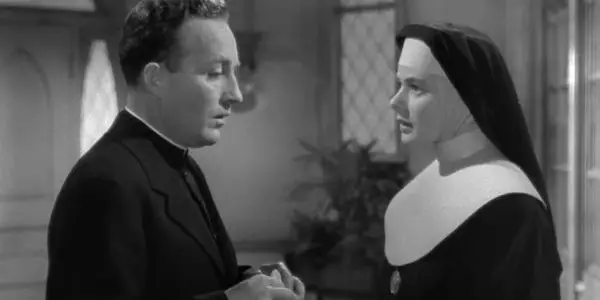Video Dispatches: BELLS OF ST MARY’S, ALL ABOUT EVE & AD ASTRA

Midwesterner, movie lover, cinnamon enthusiast.
Video Dispatches is a regular column covering recent home video releases.
The Bells of St. Mary’s (1945) – Olive Films

Leo McCarey’s 1945 melodrama The Bells of St. Mary’s sees Bing Crosby revisiting the role of straw-hatted Father O’Malley just one year after McCarey’s Going My Way. Both films find the young priest starting in a new environment, finding his place amongst its tradition and slowly ingratiating himself. Together, these films are a beautiful stage for Crosby’s talent as both actor and singer and McCarey’s developing humanism.
The Bells of St. Mary’s was a darling for critics and audiences alike, part of which Abby Bender, in her essay included in Olive’s deluxe new releases, attributes to the film’s simplicity coming on the heels of the second world war. Though I agree, I also couldn’t help but think of the complexity that’s on display on a more minor level — not thematically — between Crosby and Sister Benedict, played by the heavenly Ingrid Bergman. Much of the film is about their various civil rivalries and the emotional range they each bring to their encounters, especially during the touching conclusion is anything but simple. I prefer Going My Way between the two — that film’s observations on age and sweet indulges in song are miraculous — but in both Crosby’s O’Malley makes for such a dynamic character, walking the thin lines between naive and wise, traditional and progressive.
Olive Films’ set features three lovely new features, including one offering the perspective of a real-life sister and another on the film’s production, which does well to broach Bergman’s celebrity and star trajectory around this time. But the third feature is the most valuable: a rundown on McCarey’s career, from early silent shorts and Laurel & Hardy films to darker, weirder studio films. An important note from that supplement is that these two Crosby films came after the filmmaker had a terrible auto accident, which afforded him a new perspective on life and happiness. How he was able to render that on screen over these two films is remarkable.
All About Eve (1950) – Criterion Collection

Before Criterion’s new two-disc release, it had been nearly two decades since my only other encounter with Joseph L. Mankiewicz’s seminal Hollywood film All About Eve. And back then, though I could recognize its acerbic wit, much of its density and the corners of its full-fledged development went over my head.
It was a joy, then, to discover on this visit to recognize so much more of Mankiewicz’s genius. Particularly, the obvious sadness in Bette Davis’s performance, how well the script is able to color the perspectives of five or six separate characters, and the thematic concerns between performance and identity — a feature that has allowed its influence to spread so far.
I know there are detractors of Criterion’s consistent proclivity to release already-accessible classics like this — though I haven’t heard any complaints around this particular release — but if that point of view has any weight to it, this release of All About Eve can offer the best case scenario for a counterpoint. Not because of its presentation, which is great, but because of the absolutely stacked set of valuable special features that cover both the film and Mankiewicz’s larger contributions to Hollywood — many of which come from the participation of his family. The feature-length vintage documentary All About Mankiewicz has got to be the gem here; absolute candy for anyone interested in the figure.
Ad Astra (2019) – 20th Century Fox

When James Gray’s Ad Astra was released this past September — eight months later than originally planned — there was, at least from my vantage point, a lot of chatter regarding the film as good, albeit obviously compromised. The majority of these statements projected the film’s compromises on Brad Pitt’s voiceover, which runs throughout the film, due to claims that it was too overstated in its thematic preoccupations.
I admit I had a couple minor questions regarding the same, but after a quick second viewing, those reservations dissolved once I gathered that Pitt’s voiceover wasn’t telling viewers the thematic preoccupations of Gray’s film. Rather, the film is about the idea of making such stark self-realizations, about being open with yourself, and how that’s magnified during extended periods of isolation, and the bittersweet journey of getting to that point in your life by yourself.
Anyway, following so much conjecture regarding the specificity and the amount of studio meddling Gray had to deal with, I thought it was odd that he participated in the film’s home video release, doing commentaries for the film and deleted scenes. And I was curious to hear if he spoke at all to the film’s production turmoil on the commentary.
I’ve had some marginal trouble connecting with James Gray over the years; We Own the Night and Two Lovers, for instance, both left me scratching my head. But following his last two films, and now listening to his commentary, I’m a strong convert, in need of filling my blindspots and giving those earlier films a revisit. Rather than talking about the details of each scene, like many commentaries, Gray uses sections of the film as a jumping off point to talk about filmmaking, both as a logistical and thematic art form. It feels like listening to a nice two-hour seminar on the medium from a filmmaker more than anything else.
But the richness of the commentary aside, Gray only mentions one instance of studio interference, which regards only the film’s post-script. And, as for the much-maligned voiceover, he talks at length about the motivations and interesting collaborators involved. Needless to say, it’s a fantastic supplement added for one of the finest films of 2019.
Does content like this matter to you?
Become a Member and support film journalism. Unlock access to all of Film Inquiry`s great articles. Join a community of like-minded readers who are passionate about cinema - get access to our private members Network, give back to independent filmmakers, and more.













